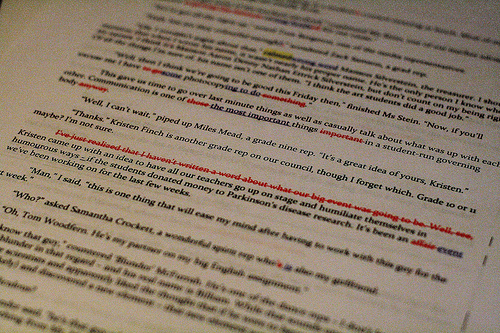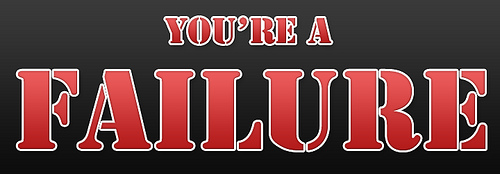Seven Common Misconceptions About Writing … and the Reality
I used to have a lot of fuzzy ideas about the writing life. From my early teens, I knew I wanted a career as a writer … but I had no clear picture of what that involved.
Since then, I’ve slowly wised up to the realities (and the joys, and the frustrations) of writing; I’ve also heard a lot of other misconceptions from new writers.
I’ll start with one of my own… and the reality that I’ve discovered.
Misconception #1: Once You Have a Book Published, You Can Quit Your Day Job
Image from Flickr by KAZVorpal.
When I started my first “proper” job, after university, I thought that once I had my novel (or any book) published, I’d be able to quit and write full-time.
I knew that bloggers sometimes got book deals, and when the lovely Shauna Reid had her book The Amazing Adventures of Dietgirl published, I snapped it up from WH Smiths’. It was clear from her blog that she was still working in her day job, and I slowly realised that I had to rethink what getting a book deal really means.
The Reality: Book Deals Aren’t That Generous
A book advance is often not enough to live on for even a year. In fact, most non-fiction authors publish books not to make money, but to grow their audience and platform: their money comes from elsewhere (perhaps client work, speaking fees, or selling their own products direct to customers).
Misconception #2: All That Matters is How Well You Write
Image from Flickr by tonyhall.
I can see why this one is an attractive idea … but sadly, you could be an outstanding writer and still fail to ever make money from your writing.
If you think about some of the books that are widely criticised for being badly written and yet still win a huge audience (Dan Brown’s thrillers and E.L James’s Fifty Shades of Grey trilogy, for instance), it’s clear that great writing isn’t the only thing that matters.
The Reality: Simply Being a Great Writer Isn’t Enough
Writers need to be able to:
- Impress an agent or editor (if they want a traditional publishing deal), by writing a great covering letter and synopsis or proposal.
- Meet deadlines and be flexible and co-operative – it might not scupper this book deal if you’re not, but you’re unlikely to be asked to write another book for the same publisher.
- Market their work to readers (if they’re self-publishing – and increasingly if they’ve been traditionally published too).
- Get to grips with technology: at the very least, you’ll need to be able to format a manuscript correctly, and communicate with busy editors / agents by email. There’s a strong chance you’ll also need some sort of web presence – a website, or social media accounts.
Of course great writing matters – and you can hire people to help you with aspects like technology and marketing – but it’s simply not true that “being a writer” means sitting in a room and writing all day without a thought for the outside world.
Misconception #3: You Have to be Original
Some new writers, of fiction and of non-fiction, get a bit obsessed with originality” or “uniqueness”. They spend a long time trying to come up with a never-before-seen idea – or they think that because they’ve got a unique story or subject to write about, their hard work is done.
The Reality: Originality is Over-Rated
It’s often said that there are only a handful of basic plots (depending on who you ask, this might be anything from one to ten). Most novels can be boiled down to a few basic elements – as this xckd comic about children’s fantasy novels suggests…
What matters is what you bring to your idea: your treatment of it (your characters and writing style) and your combination of different elements (as in genres like paranormal romance) is what makes your story unique.
(The same applies to non-fiction: there are dozens of books on most subjects, but yours might be more in-depth, or more humorous, or more up-to-date, or more engaging than the others.)
Misconception #4: Self-Publishing Means You’ve Failed
Image from Flickr by Sean MacEntee.
Although self-publishing has become much more common over the past decade, with the rise of print-on-demand and e-publishing, some writers still believe that there’s a stigma attached. They carry on seeking an agent – even if they’ve been sending out their manuscript again and again for a year or more.
The Reality: Self-Publishing Can be a Great Way Forward
Having a publisher definitely offers certain benefits – in particular, it means your book will be in physical book stores – but there’s a lot you can do for yourself.
You might well choose to self-publish because you’ll have more control over the book (no-one will edit your writing or give you a cover you hate) – and because you’ll have a far higher share of the profits. Some authors are also now self-publishing their books and later accepting traditional book deals, from a much stronger negotiating position than an unpublished author.
Misconception #5: The Writing Life is Glamorous
Image from Flickr by tetraconz.
When you see writers depicted on the television or in films, they often have rather glamorous lives. (If you’re a fan of ABC’s Castle, you’ll know that author Richard Castle has a very nice New York apartment, flashy book launches, huge displays of his books in shops, and an exciting partnership with the NYPD.)
It’s easy to picture the writing life as easy or glitzy; perhaps you imagine long boozy lunches with your agent, or even something as simple as days spent daydreaming about your book and effortlessly writing page after page.
The Reality: The Writing Life is Hard Work (and Not Immediately Rewarding)
For most writers, life isn’t particularly glamorous. They might get out to book launches or story readings or writers’ circles – but these are likely to involve mugs of tea or paper cups of cheap wine, not bottles of champagne. Many publishers and agents won’t the budget to treat authors to more than a cup of coffee.
Writers spend most of their time tapping away at a keyboard, pausing frequently to struggle with a knotty plot issue or a tricky line of dialogue. Friends and relatives may or may not be supportive, but unless they’re writers themselves, they’re unlikely to understand many of the frustrations that writing involves.
Misconception #6: You Have to Protect Your Idea from Unscrupulous Editors / Agents
Image from Flickr by Trevor Blake.
Some authors get very anxious about copyrighting their work, worrying that their idea will be stolen. They don’t want to include much detail when pitching articles to magazines, or they fret over letting an agent see a synopsis of their book.
This might even get extended to fellow writers: a few aspiring authors are so protective of their work that they won’t show it to a workshop group or discuss it over a drink.
The Reality: Ideas Aren’t That Valuable
Editors and agents are inundated with manuscripts. They don’t have the time, or the need, to steal your idea and write it in their own way (or give it to another author to write). The same goes for fellow writers – they might be inspired by an aspect of your work, but they’ll inevitably write in their own way, and you don’t have to worry that they can “steal” from you.
Misconception #7: Publishers Should Treat Authors Better

Image from Flickr by Gamma-Ray Productions.
While some publishers are unscrupulous or incompetent – just like a minority of companies in any business area – most do treat authors fairly.
Some unpublished authors complain that publishers should read their whole novel before rejecting it, or moan that publishers only want commercial books rather than ones with literary merit. I’ve even read letters in writing magazines from writers proposing some form of charter that publishers should be made to sign up to (saying that they’ll read unsolicited work and get back to authors within a certain period of time, provide feedback, and so on).
The Reality: Publishers Don’t Owe You Anything
Imagine that you’re a freelance writer, specialising in advertising copy. You phone a local business, offering to take them on as a client. They say “No, thanks” almost immediately – they already have a freelancer who they work with.
Would you be offended? Almost certainly not. You’re a service provider, and they simply don’t need your services at this time.
The same applies (or should apply!) to unpublished writers. Publishers and agents have far more manuscripts than they need: why should they be under any obligation to read yours? I know that sounds a little harsh, but publishing is a business for them, and they simply don’t have the time to spend five hours reading your full manuscript and writing a critique for you.
So … Is Writing Worth It?
I realise this post might seem a bit discouraging. I know that when I was a new writer, the hope of quitting my day job and enjoying glamorous book launches helped spur me on!
None of it happened quite the way I’d once hoped or expected – but that didn’t matter. I love writing, and I’d write regardless of whether there was any chance of being published or making money.
Writing is definitely worth it. Yes, it’s a difficult road at times – there’s not much glamour or recognition, especially when you’re just starting out. But it’s also a wonderful journey – and you’ll meet many wonderful fellow writers for company along the way.
If you’d like some support with your writing, check out my teaching/community site, Writers’ Huddle. We only open for new members a couple of times a year, but you can pop your email address in there to get a notification as soon as the doors open up.
About

I’m Ali Luke, and I live in Leeds in the UK with my husband and two children.
Aliventures is where I help you master the art, craft and business of writing.
Start Here
If you're new, welcome! These posts are good ones to start with:
Can You Call Yourself a “Writer” if You’re Not Currently Writing?
The Three Stages of Editing (and Nine Handy Do-it-Yourself Tips)
My Novels

My contemporary fantasy trilogy is available from Amazon. The books follow on from one another, so read Lycopolis first.
You can buy them all from Amazon, or read them FREE in Kindle Unlimited.
14 Comments
Trackbacks/Pingbacks
- Seven Common Misconceptions About Writing … and the Reality - First Edition Books - [...] Seven Common Misconceptions About Writing … and the Reality [...]
- Monday Must-Reads (5/27/13) - YESENIA VARGAS - [...] Seven Common Misconceptions About Writing … and the Reality — Aliventures [...]








Love this, Ali.
As someone who makes her living with words (not yet the fiction words that are in my head – but in other ways), I couldn’t agree more with the realities that you set down here. I recently wrote a two-part series on the secrets of successful freelancer writers. (I hope you don’t mind if I share: http://nhwn.wordpress.com/2013/04/04/secrets-of-successful-freelance-writers-part-2-of-2/) My point is that success has less to do with how stellar your writing is and more to do with the overall value you deliver. That value (in my freelance world) comes in the form of making my clients’ lives easier, delivering copy and stories that meet their needs … on time, properly formatted, etc.
Writing is just like any other job. You have good days and bad days. You have parts of it that you love and parts of it that you hate. And, you definitely have to WORK at it! Better to accept that reality sooner than later … so you can get on with gettin’ on with it. 😉
Suddenly Jamie’s last blog post ..How to love marketing (even when the very word makes you cringe)
Thanks, Jamie! And I’m with you on freelancing — clients would much rather have copy on time than copy that’s worthy of Shakespeare.
Thanks for sharing your two-part series too (of course I don’t mind!) — I particular like your tip on creating systems, which I think makes life much easier when juggling multiple clients and projects, and as you say, saves a lot of reinventing-the-wheel time.
🙂 Yes. Reinventing the wheel every time = very time consuming and not fun.
Thanks so much for reading!
Have a great weekend.
Suddenly Jamie’s last blog post ..How to love marketing (even when the very word makes you cringe)
Fantastic post, Ali! I especially love the misconception that if you self-publish, it means you’re a failure. Self-publishing is becoming more and more a way to get out there and establish yourself as an author. Christopher Paolini (the Eragon series guy) self-published his books and then was snapped up by a traditional publisher. I don’t know how often it happens, but it does happen.
Jessica Flory’s last blog post ..How to Get Published
Thanks, Jessica! That’s a great point about Christopher Paolini — and G.P. Taylor (author of the Shadowmancer series) did the same. With digital self-publishing, Amanda Hocking is a good example of an author who got a traditional deal after self-publishing success; E.L. James (Fifty Shades of Grey) is another!
Possibly the best article I have ever read about what it means to be a writer!
I quit a full time job last year in order to devote more time to writing. In the beginning I made great strides in organizing my writing, but very little changed in the actual ‘sitting down and writing part’. I am now headed back to a full time job and look forward to balancing my “real job” with my “real passion”. Apparently I need the motivation of making the most of the time I have as opposed to having the whole day to write. (And you meet interesting people which leads to interesting story ideas!)
Thanks for a great article!
Thanks so much, CJ! I think you’re far from the only writer who finds it’s easier to be disciplined (and inspired) when life is pretty full. Hope you enjoy the new day job. 🙂
Wise words as usual Ali, great to ‘have you back’!
I’ll forward this to a couple of aspiring writers I know who insist that a regular publisher is the ONLY route. They’re expending huge amounts of time and energy in finding said publisher that would, (in my opinion) be better spent polishing off their scribblings!
Regarding the glamour, hmm; I write about getting your hands dirty so ho hum! Still, there is nothing like the mini thrill of clicking ‘publish’ is there?
Ian Anderson’s last blog post ..LED lamp out of old bottle
Thanks Ian — and thanks for passing this on!
I’ve come across some excellent writers who are convinced that they just need to find an agent or publisher who’s interested in their work — but even those who manage to cross that (considerable) hurdle won’t necessarily see eventual publication.
Clicking “publish” always feels good — and getting paid for your writing is another thrill. 🙂
Thanks for these great words of wisdom, and perspective on what is to me the very new world of writing!
Thanks Karen — and welcome to the world of writing. 😀
Wonderful post! One wrong conception or feeling I had when I started writing was that I shouldn’t change major sentence structures when editing my work. I know this sounds funny, but I literally would fear changing original sentence structure when editing. Especially with poetry, I feared changing the structure of my work.
Thanks Laila! That’s a new one on me — though I’m not a poet, and I can imagine that if I was, I’d worry about changing the structure and then unraveling the whole thing (which happens to me with knitting…) I’m sure poems are more robust than that, really, though.
Thank you. Very nicely written.